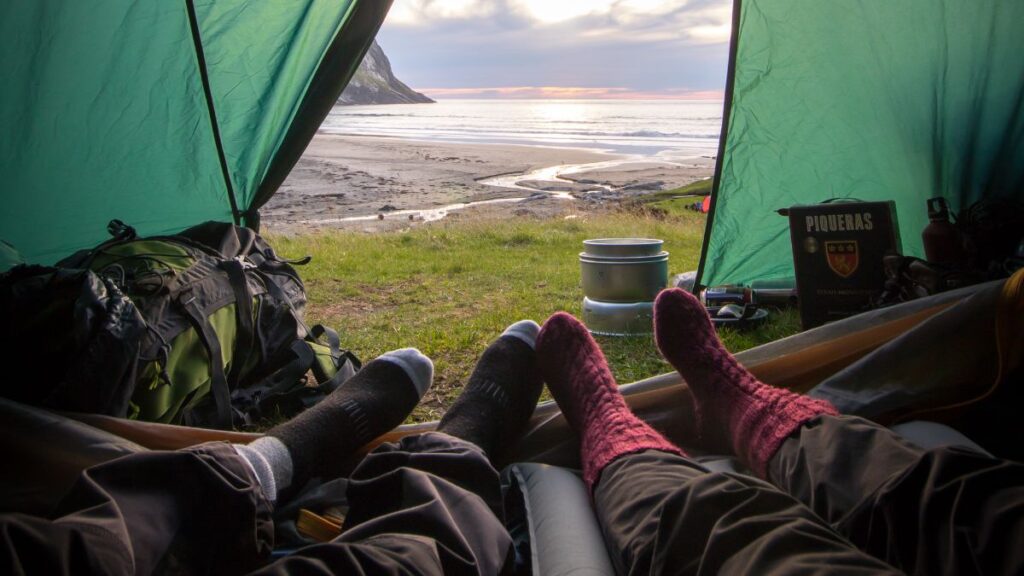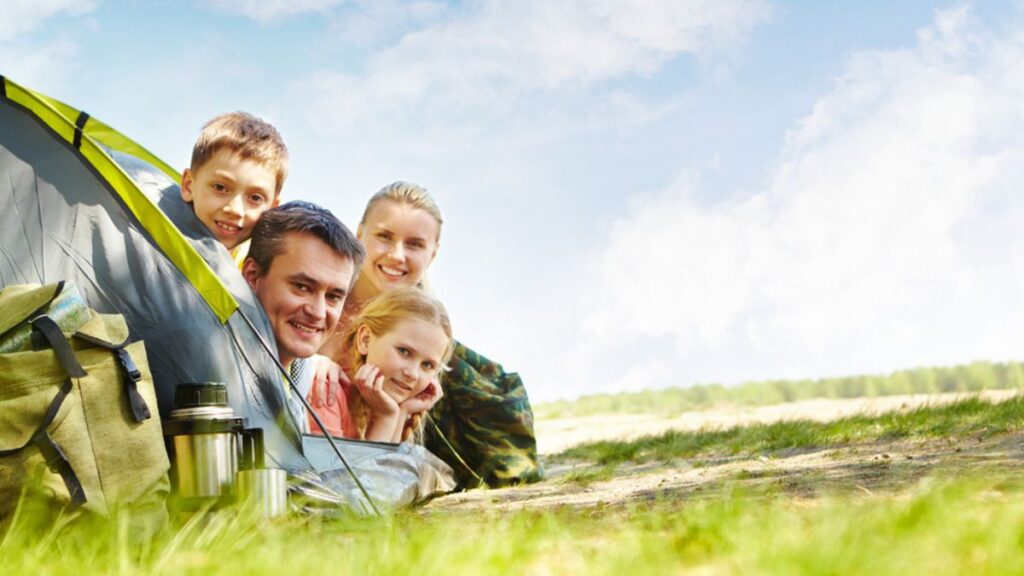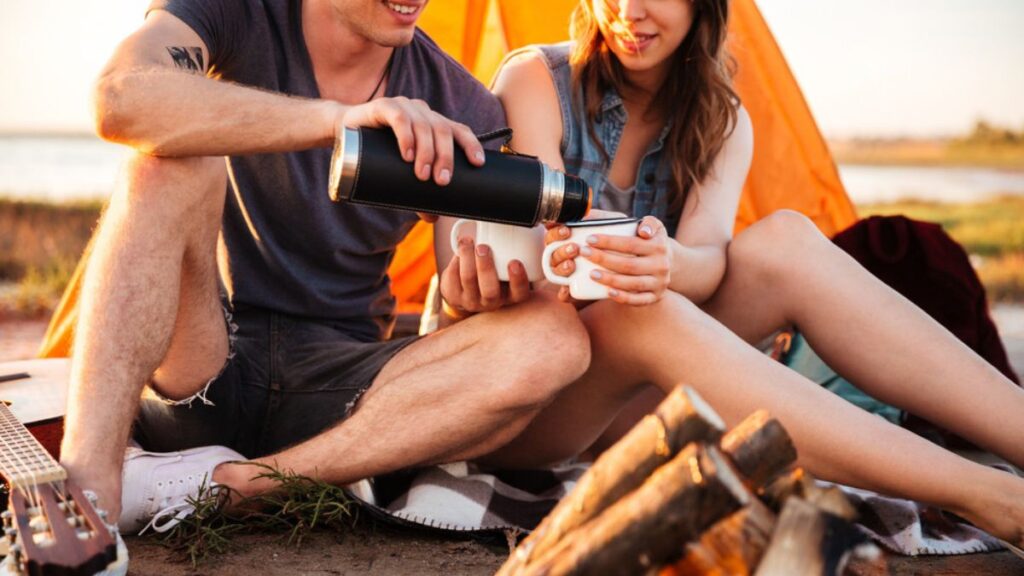Ready to hit the great outdoors? Getting ready for your first camping trip can seem a bit daunting, especially if you’re not sure where to start. Don’t worry – I will help!
KOA North American Camping Report 2022 Stats shows, 58% of households that went camping in 2021 had children. It is very much possible that you are panning a family outing or with a pet.
Being an intermediate level camper, I learnt few things about camping and would like to share with you all. If you’re a newbie eager to make the most of their first trip, I’ll show you everything you need to know about making your camping experience as comfortable and enjoyable as possible.
Camping Tips for Beginners

If you’re a camping beginner and are eager to get out there, but don’t know where to start, congratulations—you’ve come to the right place! Camping is an exciting and enjoyable way to explore nature, as well as have some quality time with your family or friends. But before you hit the great outdoors, here are some tips for camping beginners that will make sure your experience is safe and fun.
The first tip for camping beginners is to plan ahead. Do your research on the campsite you’ll be visiting and determine the essential items you’ll need. Additionally, come up with a packing list of items like a tent, sleeping bag, food and drinks, camping games and outdoor gear that are tailored to your destination.
Another tip when it comes to camping is to be prepared for bad weather. Make sure you check the forecast prior to heading out so that you can pack accordingly—like bringing rain gear or extra layers depending on what the weather report predicts. It may seem obvious but ensure that all essential safety items (like flashlights, extra fuel and batteries) are in good working order in case of emergencies—this will allow for a smoother trip overall and keep everyone safe during their time in nature.
How to choose the best campsite for your camping?
Being a beginner, you will definitely confuse to pick the best campsite for yourself. As per my experience, I suggest you to consider factors like accessibility, weather, level ground, and proximity to natural attractions. Opt for established campgrounds with amenities, near home or easily reachable by car.
You should prioritize safety by avoiding extreme weather areas and flood-prone grounds. Look for privacy, protection from wind, and a mix of sun and shade.
Don’t forget to check the weather forecast for the duration of your trip and avoid areas prone to extreme weather conditions like heavy rains, strong winds, or severe cold. Terrain is another aspect to be considered. Look for level ground where you can pitch your tent and set up your campsite comfortably. Stay clear of areas susceptible to flooding or standing water.
Camping Tips for Cold and Rainy Weather

Nobody wants to camp in a downpour, but with the right equipment and planning, camping in colder weather can be a great experience. Here are some tips to make sure you stay comfortable and safe:
- Dress in layers. Make sure you have a variety of warm clothing options – start with a base layer, add an insulation layer, and top it off with an outer layer. This will help you regulate your temperature better.
- Bring along waterproof gear. If you’re out in the rain, having good waterproof boots and rain gear is essential for keeping dry.
- Set up your campsite correctly. Pitch your tent on the ground that’s sloped to allow any water run-off away from the tent. Additionally, make sure that stakes are secure and properly driven into the ground so that the tent stays put.
- Stay warm at night. Bring along a thick sleeping bag or blankets to sleep comfortably through the night – also consider getting an insulated sleeping pad or foam mat for extra warmth.
It’s important to always be prepared when camping, but especially when it’s cold or wet outside – investing in the right gear will go a long way toward keeping you comfortable!
How to Stay Warm in Cold Weather Camping

When camping in cold weather, one of your top priorities should be staying warm. Here’s how:
- Layering is Key
When camping in the cold, you should layer up with clothing that will provide insulation and keep you warm. Make sure to wear synthetic or wool fabrics so you don’t get too sweaty. Then, layer on some additional pieces such as a lightweight scarf or beanie to keep your neck and head warm; and gloves and thick, insulated socks to keep your hands and feet warm.
- Invest in Quality Cold-Weather Gear
Investing in quality travel gear for camping can make a huge difference when camping in cold weather. Consider getting a fire starter kit so you can start a fire for warmth quickly and easily; an insulated sleeping pad for extra warmth; extra-warm blankets that are designed for cold weather; and insulated jackets to keep you protected from the elements.
- Eat and Drink Warm Foods & Beverages
Keeping your body temperature regulated is key when camping in the cold, so eating warm foods like soups, chilli, stews and hot chocolate can help you stay warm from the inside out. Drinking hot beverages like coffee or tea can also help regulate your body’s temperature while keeping you hydrated. Just make sure they’re caffeine-free if you plan on going to bed soon after!
How to Make Your Camping Tent Waterproof

Making sure your tent can withstand a storm is essential to a successful camping trip, so waterproofing it should be high on your to-do list.
Fortunately, there are plenty of ways to make this process easier and more efficient. Here are some tips you can use to make your camping tent a little more waterproof:
- Use Seam Sealers
The first step is to make sure that all of the seams of the tent have been sealed. You can use seam sealers for this, which help create a waterproof barrier and prevent any water from seeping through the fabric.
- Sprays or Coatings
If you want an extra layer of protection, you can also use sprays or coatings. These provide an additional layer of waterproofing and help keep your tent from getting too wet or damaged in the event of a storm or other wet conditions. Just be sure to do a test run first before applying it to your entire tent!
- Don’t Forget the Floors!
Lastly, don’t forget about protecting your tent’s floors as well! A tarp can help provide an extra layer of protection and help keep moisture out. If you’re looking for something even more durable, there are also specialized floor coverings that are specifically designed for campers that provide extra waterproofing and durability.
By following these tips and making sure that your tent is properly sealed and protected, you’ll be well on your way to having an enjoyable and completely dry camping experience!
Camping Tips with Kids and Family

If you’re thinking of camping with kids or family, there are a few extra tips you should consider. Camping can be an enjoyable activity with the right planning and preparation, so here are a few tips to help make your trip as fun and stress-free as possible:
- Pick the right campsite
When you go camping with kids and family, look for a campground that has facilities that your group can enjoy. A good campsite should have plenty of shade, running water, restrooms and activities like hiking trails, fishing ponds or swimming areas.
- Bring food that’s easy to make
When camping with a group, it’s important to make sure everyone eats well. Pack food that is easy to cook over the campfire and has a variety of servings so there will always be something tasty for everyone. Don’t forget essentials like cooking oil, spices and condiments too.
- Pack the right equipment
You’ll need different gear when camping with family members. Make sure you have enough sleeping bags for everyone in the group; if you don’t have enough tents for everyone, think about getting an extra-large one for all of you to sleep in together. Also, consider bringing games such as cards or board games to keep things fun when nights get boring.
By following these tips on camping with kids and family, you’ll make sure the whole group is safe and happy while having lots of fun during your outdoor adventure!
Tips if Camping with Pets

Camping with pets can be a great experience, but it’s important to plan ahead. Make sure you bring everything your pet needs, like food, bowls, and leashes. Make sure you bring a pet first-aid kit, in case of emergencies. If you’re camping near a lake or stream, make sure you bring a life jacket for your pet.
Before heading out, check with the campground to make sure that they accept pets. Also, check if there are any restrictions or rules you need to follow while camping with your pet. Some campsites require that pets remain on a leash at all times.
Are you a furry friend lover who also loves camping? You can bring your pets along with you when you go camping, as long as you take the right precautions. Here are a few tips, so you and your pet can have a great experience!
- Research
Research beforehand if the campground allows pets—some campgrounds may have restrictions or extra fees if they allow them.
- Vaccinations
Make sure your dear pet is up to date on all their vaccinations. You don’t want to risk any illnesses while outdoors.
- Preparedness
Pack for your pet just like you would for yourself—with items like water, food, leash and waste cleanup bags. Some items that might come in handy that include:
- Bed or crate
- First-aid kit tailored to pets
- Toys treats and collapsible bowls
- Tick pickups and flea control treatments
- Nail clippers and brush
You’ll also need to prepare for potential risks for animals outdoors like wildlife and other animals in the area by staying on trails when hiking with your pet, keeping them within sight when possible and always keeping them on a leash or lead when necessary so they don’t wander off into potentially dangerous territory. Camping with pets can be an enjoyable experience, but it’s important to plan ahead and be aware of any rules or regulations you need to follow. With the proper preparation, you and your furry friend can have a safe and fun camping trip! Just be sure to plan ahead and remember these tips before taking your pet camping — both of you should get to enjoy nature responsibly!
“Leave No Trace” Principle
Adhere to camping regulations, respect wildlife, and practice “Leave No Trace” principles. As you gain experience, your preferences may change, but starting with these considerations ensures a comfortable and enjoyable camping experience while minimizing potential challenges.
Best way to do that is to become familiar with camping regulations in the area, including permits, campfire guidelines, and waste disposal procedures. Ensure you camp at a safe distance from wildlife habitats and respect local wildlife.
Do’s and Don’ts of Camping

Camping is a fun and exciting way to get out into nature, but there are some important rules and regulations to follow in order to protect the environment and ensure a safe and enjoyable experience for all involved. If you’re just getting into camping, there are a few dos and don’ts that you should keep in mind before hitting the great outdoors.
Do:
- Make sure you have the appropriate camping gear, such as a tent, sleeping bags and mats, as well as a cooking set and food.
- If you’re camping in the wild, always remember to practice Leave No Trace principles by removing any waste or trash from the campsite before leaving.
- Familiarize yourself with any local fire regulations or restrictions before starting a campfire.
- Enjoy nature – this is your time to relax! Take some time to appreciate your surroundings and take in the beauty of nature.
Don’t:
- Don’t forget important items like sunscreen or insect repellant – no one likes getting sunburned or eaten alive by bugs!
- Don’t forget to read up on potential hazards like wildlife or terrain before embarking on your camping trip.
- Don’t underestimate how quickly temperatures can drop at night – make sure you bring enough warm clothing for the night and always be prepared for any unexpected weather changes.
- Most importantly, don’t be afraid to ask for help if needed! The more experienced campers around you will be more than happy to answer any questions you might have and offer advice if needed.
Conclusion
Camping can be an incredibly enriching and rewarding experience, and it’s worth getting outdoors to try it out. Before you go, do some research and make sure you have all the correct gear and supplies. And when you’re out there in the great outdoors, remember to respect nature and leave everything as you found it.
Once you’ve tried it, it’s likely you’ll be hooked for sure. Camping can open up so many possibilities and introduce you to new people and places. Spend some time figuring out the basics and with a little planning and preparation, you’ll soon be camping like a pro and getting to know the great outdoors.



Leave a Comment